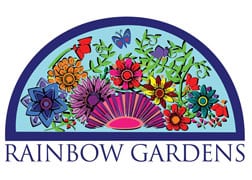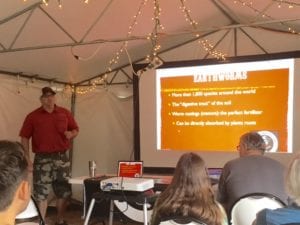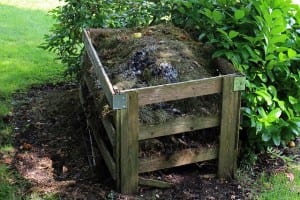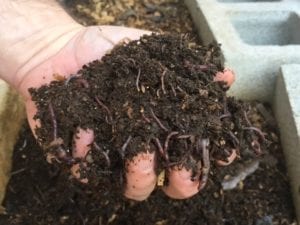I went to the Worm Composting seminar featuring Kyle Harrell from Texas Red Worms a few weeks ago to take some pictures for our website. I didn’t know what to expect at a seminar about worm composting and I had no idea I would become hooked on this method in a matter of 60 minutes. Not only does Kyle reel you in with his obvious passion for vermicomposting, but the list of benefits that your soil and plants reap from this process makes you want to say, “sign me up”! For the majority of the seminar I found myself sitting with my camera in my lap as I furiously scribbled down notes because I did not want to forget a single word that Kyle said. A few pictures were snapped but I was so interested in what he had to say, I didn’t give the pictures much of a chance. However, after the seminar, Kyle was gracious enough to allow me to make an appointment to come where he raises his worms and see the process in action. (I almost forgot to take pictures there too!) Like I said, I got hooked. So I decided to compile a couple of blogs to show how these little creatures unexpectedly wriggled their way into my heart. This blog is just a tease to get you interested in more to come.
(Oh, hey look…I got a picture of Kyle. He had me at worms!)
We preach over and over about constantly feeding the billions of microbes in your soil by adding organic matter to it. Organic matter gets utilized one hundred percent by the microbes which creates a healthy, sustainable environment in your soil and an amazing foundation for your plants to grow. One of the best ways to feed these microbes is with compost. I’ve been gradually building the soil in my raised beds by adding compost throughout the seasons, as I know this is perhaps the most important aspect of successful gardening. But I found myself less likely to want to do this because I had to keep opening my wallet to purchase bags of compost since I didn’t have my own. I eventually did start my own compost bin but found that the composting process takes some time, and I’m not all that patient, so I usually end up purchasing it. But sometimes compost can be expensive and sometimes I am concerned with what exactly is in my compost. Wouldn’t it be great to find a way to be sure you are getting a pure compost product and also save money while doing it?
(Do you know what your compost is hiding?)
Enter the worms. They can accelerate the process of composting and while doing so, somehow, create a pH neutral product. Meaning that what they take in gets detoxified, and when it is excreted you are left with only the good stuff in the form of pH neutral worm castings. It is so pH neutral in fact, that it is the only manure that can be directly applied to plant roots without burning them. Now that’s some good, pure stuff. Steep some of those worm castings in unchlorinated water and you have just made yourself a compost tea that you can spray on your plants as a natural fungicide and insecticide. There is a reason they call this compost tea “liquid gold”. Kyle has wiped out chinch bug and ant infestations using only his compost tea. Now we’re talkin’! You can probably see how this product is going to save you money. It’s like an all-in-one. Compost, fertilizer, pesticide, fungicide, plus microbial action that encourages aeration and activity in the soil….sounds like a superhero of some sorts.
(Tons of worms in Kyle’s hand there. They are major workhorses!)
There is a ton of information out there on the internet that you can sift through, but a great place to start is Kyle’s site, TexasRedWorms. There is very little risk to the great reward of vermicomposting and if you have any doubts that worm composting is a great adventure to embark on, you only need to speak to Kyle Harrell once and he will set you straight. He is bursting with more knowledge than I can ever pass on, and he is happy to share. Kyle got into the whole business of worm composting when he got tired of blowing so much money on compost and fertilizers and was looking for another way. He did plenty of research and realized that with minimal supplies he could begin making his own fertilizer. And when he saw results in the vitality of his plants and realized that the fertilizer he had created was way better than those he had been purchasing, he was all in. And that is exactly what I hope to do too. Maybe not on as big of a scale as Kyle, but if I can make my own compost, blend my own compost tea, and by doing this save money while growing the healthiest plants I’ve grown to date, I am all in too. In our high tech world, sometimes it’s important to go back to the old technology. Composting is what worms do naturally. And I am ready to get back to the basics too. Stay tuned for the next installment of worm composting where I’ll walk you through what you need to welcome these little wrigglers to your garden. P.S. I’ve already got my first bin and am raring to go.
The Happy Gardener
Lisa Mulroy




Trackbacks/Pingbacks